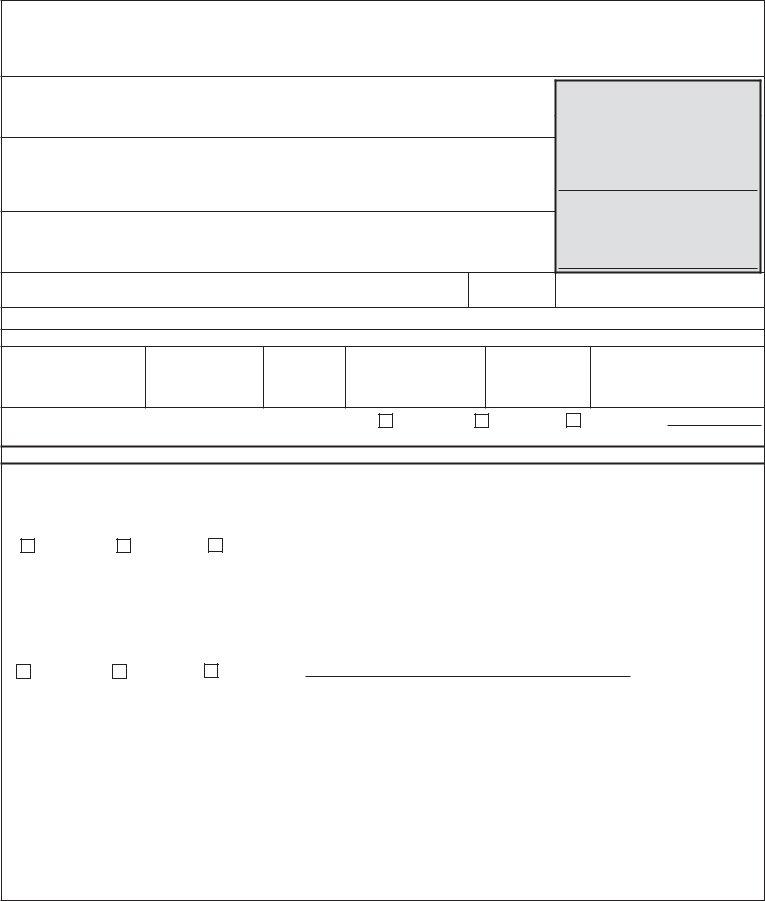The FEMA 81-65 form, officially known as the Floodproofing Certificate for Non-Residential Structures, is a vital document issued by the Department of Homeland Security’s Federal Emergency Management Agency (FEMA). This form serves as a certification for non-residential buildings that have been adequately floodproofed below the Base Flood Elevation (BFE). The form's primary purpose is to estimate accurate risk premium rates for providing flood insurance to new or substantially improved structures within Special Flood Hazard Areas. It includes provisions for the documentation of floodproofing measures, essential for obtaining favorable flood insurance rates through the National Flood Insurance Program (NFIP). Such a certification requires detailed information about the building's design and construction, ensuring it is watertight and capable of withstanding various flood-related forces such as hydrostatic and hydrodynamic loads, along with the impact of debris. The FEMA 81-65 form mandates contributions from professionals like registered engineers or architects to certify that the floodproofed construction complies with recognized standards and regulations. Additionally, it encompasses a commitment towards maintaining the floodproofing measures over time, highlighting the importance of a comprehensive approach to flood risk management in non-residential property construction and maintenance. The form underscores the collaborative effort between building owners, insurance companies, and regulatory bodies to mitigate flood damage, emphasizing the legal and practical implications of floodproofing in vulnerable areas.
| Question | Answer |
|---|---|
| Form Name | Fema Form 81 65 |
| Form Length | 4 pages |
| Fillable? | No |
| Fillable fields | 0 |
| Avg. time to fill out | 1 min |
| Other names | elevation floodproofed form pdf, form floodproofing certificate pdf, fema floodproofing, floodproofing certificate fema form 086 0 34 |

DEPARTMENT OF HOMELAND SECURITY
Federal Emergency Management Agency
FLOODPROOFING CERTIFICATE |
OMB Control Number. |
FOR |
Expiration: 11/30/2018 |
|
|
Paperwork Burden Disclosure Notice |
|
Public reporting burden for this data collection is estimated to average 3.25 hours per response. The burden estimate includes the time for reviewing instructions, searching existing data sources, gathering and maintaining the data needed, and completing and submitting this form. You are not required to respond to this collection of information unless a valid OMB control number is displayed on this form. Send comments regarding the accuracy of the burden estimate and any suggestions for reducing the burden to: Information Collections Management, Department of Homeland Security, Federal Emergency Management Agency, 1800 South Bell Street, Arlington, VA
General: This information is provided pursuant to Public Law
Authority: Public Law
Privacy Act Statement
Authority: Title 44 CFR § 61.7 and 61.8.
Principal Purpose(s): This information is being collected for the primary purpose of estimating the risk premium rates necessary to provide flood insurance for new or substantially improved structures in designated Special Flood Hazard Areas.
Routine Use(s): The information on this form may be disclosed as generally permitted under 5 U.S.C. § 552a(b) of the Privacy Act of 1974, as amended. This includes using this information as necessary and authorized by the routine uses published in
Disclosure: The disclosure of information on this form is voluntary; however, failure to provide the information requested may result in the inability to obtain flood insurance through the National Flood Insurance Program or being subject to higher premium rates for flood insurance. Information will only be released as permitted by law.
Purpose of the Floodproofing Certificate for
Under the National Flood Insurance Program (NFIP), the floodproofing of
A floodproofed building is a building that has been designed and constructed to be watertight (substantially impermeable to floodwaters) below the BFE and with structural components having the capability of resisting hydrostatic and hydrodynamic loads and effects of buoyancy. Before a floodproofed building is designed, numerous planning considerations, including flood warning time, uses of the building, mode of entry to and exit from the building and the site in general, floodwater velocities, flood depths, debris impact potential, and flood frequency, must be addressed to ensure that dry floodproofing will be a viable floodplain management measure.
The minimum NFIP requirement is to floodproof a building to the BFE. However, when it is rated for flood insurance
Additional guidance can be found in FEMA Publication 936, Floodproofing
FEMA Form |
Page 1 of 4 |

FLOODPROOFING CERTIFICATE
FOR
The floodproofing of
BUILDING OWNER'S NAME
STREET ADDRESS (Including Apt., Unit, Suite, and/or Bldg. Number) OR P.O. ROUTE AND BOX NUMBER
OTHER DESCRIPTION (Lot and Block Numbers, etc.)
FOR INSURANCE COMPANY USE
POLICY NUMBER
COMPANY NAIC NUMBER
CITY
STATE
Zip Code
SECTION I – FLOOD INSURANCE RATE MAP (FIRM) INFORMATION
Provide the following from the proper FIRM:
COMMUNITY NUMBER
PANEL NUMBER
SUFFIX
DATE OF FIRM INDEX
FIRM ZONE
BASE FLOOD ELEVATION (in AO Zones, Use Depth)
Indicate elevation datum used for Base Flood Elevation shown above:
NGVD 1929
NAVD 1988
Other/Source:
SECTION II – FLOODPROOFED ELEVATION CERTIFICATION (By a Registered Professional Land Surveyor, Engineer, or Architect)
All elevations must be based on finished construction.
Floodproofing Elevation Information: |
|
|
|
|
|
|
|
|
|
|
|
Building is floodproofed to an elevation of |
|
|
. |
|
|
feet (In Puerto Rico only: |
|
. |
|
meters). |
|
NGVD 1929 |
NAVD 1988 |
Other/Source: |
|
|
|
|
|
|
|||
(Elevation datum used must be the same as that used for the Base Flood Elevation.)
Height of floodproofing on the building above the lowest adjacent grade is |
|
|
feet (In Puerto Rico only: |
|
|
|
meters). |
||||
For Unnumbered A Zones Only: |
|
|
|
|
|
|
|
|
|
|
|
Highest adjacent (finished) grade next to the building (HAG) |
|
. |
|
|
feet (In Puerto Rico only: |
|
|
. |
|
meters). |
|
NGVD 1929
NAVD 1988
Other/Source:
(NOTE: For insurance rating purposes, the building’s floodproofed design elevation must be at least 1 foot above the Base Flood Elevation to receive rating credit. If the building is floodproofed only to the Base Flood Elevation, then the building’s insurance rating will result in a higher premium. See the Instructions section for information on documentation that must accompany this certificate if being submitted for flood insurance rating purposes.)
FEMA Form |
Page 2 of 4 |

FLOODPROOFING CERTIFICATE
FOR
Section II certification is to be signed and sealed by a land surveyor, engineer, or architect authorized by law to certify elevation information
I certify that the information in Section II on this Certificate represents a true and accurate interpretation and determination by the undersigned using the available information and data. I understand that any false statement may be punishable by fine or imprisonment under 18 U.S. Code, Section 1001.
CERTIFIER'S NAME |
LICENSE NUMBER (or Affix Seal) |
|
|
|
|
|
|
TITLE |
COMPANY NAME |
|
|
|
|
|
|
|
|
|
|
ADDRESS |
CITY |
STATE |
ZIP CODE |
|
|
|
|
PLACE
SEAL HERE
SIGNATURE
DATE
PHONE
SECTION III – FLOODPROOFED CERTIFICATION (By a Registered Professional Engineer or Architect)
I certify the structure, based upon development and/or review of the design, specifications,
The structure, together with attendant utilities and sanitary facilities is watertight to the floodproofed design elevation indicated above, is substantially impermeable to the passage of water, and shall perform in accordance with the 44 Code of Federal Regulations
(44 CFR 60.3(c)(3).
All structural components are capable of resisting hydrostatic and hydrodynamic flood forces, including the effects of buoyancy, and anticipated debris impact forces.
I certify that the information in Section III on this certificate represents a true and accurate determination by the undersigned using the available information and data. I understand that any false statement may be punishable by fine or imprisonment under 18 U.S. Code, Section 1001.
CERTIFIER'S NAME |
LICENSE NUMBER (or Affix Seal) |
|
|
|
|
|
|
TITLE |
COMPANY NAME |
|
|
|
|
|
|
|
|
|
|
ADDRESS |
CITY |
STATE |
ZIP CODE |
|
|
|
|
PLACE
SEAL HERE
SIGNATURE
DATE
PHONE
Copy all pages of this Floodproofing Certificate and all attachments for 1) community official, 2) insurance agent/company, and 3) building owner.
FEMA Form |
Page 3 of 4 |

FLOODPROOFING CERTIFICATE
FOR
Instructions for Completing the Floodproofing Certificate for
To receive credit for floodproofing, a completed Floodproofing Certificate for
In order to ensure compliance and provide reasonable assurance that due diligence had been applied in designing and constructing floodproofing measures, the following information must be provided with the completed Floodproofing Certificate:
•Photographs of shields, gates, barriers, or components designed to provide floodproofing protection to the structure
•Written certification that all portions of the structure below the BFE that will render it watertight or substantially impermeable to the passage of water and must perform in accordance with Title 44 Code of Federal Regulations (44 CFR 60.3 (c)(3))
•A comprehensive Maintenance Plan for the entire structure to include but not limited to:
•Exterior envelope of the structure
•All penetrations to the exterior of the structure
•All shields, gates, barriers, or components designed to provide floodproofing protection to the structure
•All seals or gaskets for shields, gates, barriers, or components
•Location of all shields, gates, barriers, and components as well as all associated hardware, and any materials or specialized tools necessary to seal the structure.
FEMA Form |
Page 4 of 4 |